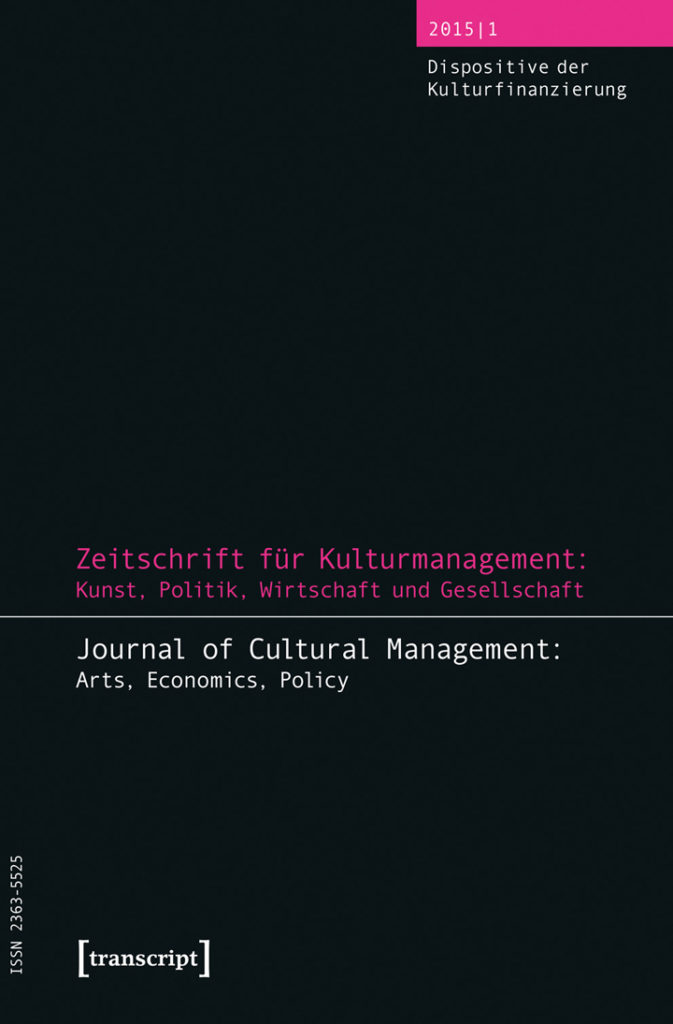Research Article
Dispositive der Kulturfinanzierung
Abstract
Based on two theoretical concepts by Michel Foucault, dispositive factors of cultural funding are analyzed. Foucault emphasized that the “dispositive,” as a network of discourses and institutions, is best analyzed through genealogic research, excavating settings of power and influences that modify the operative mode of a “dispositif” in power. The Austrian development of private non-profit cultural organizations is analyzed as an example. More general frames to the subject are given by referring to the controversial discourse about “freedom of expression in the arts” as well as sociopolitical tasks of art and cultural organizations.
Keywords
2015 (1)
Dispositive der Kulturfinanzierung

Related Articles
Journal of Cultural Management and Cultural Policy
Research Article
Covid-19 and Ballet Production in Japan: The Impact of the Crisis
Journal of Cultural Management and Cultural Policy 2024
Essay
Journal of Cultural Management and Cultural Policy 2024
Research Article
Journal of Cultural Management and Cultural Policy
Essay
Art and Culture as an Urban Development Tool
A Diachronic Case StudyJournal of Cultural Management 2016 (1)
Research Article
Evaluation im kulturpolitischen Wirkungsbereich
Grundprobleme und HerausforderungenJournal of Cultural Management 2017 (1)
Research Article
© 2026, Journal of Cultural Management and Cultural Policy
Keywords
- Aesthetics
- Higher Education
- Cultural Diplomacy and Foreign Cultural Policy
- Occupation
- Career and Professional Role
- Audience Development
- Audience Studies and Visitor Studies
- Visitor Motivations
- Business
- Covid Pandemic
- Democracy
- Digitalization
- Diversity
- Third Sector
- Empirical Aesthetics
- Development
- Ethics
- Evaluation
- Field Theory
- Festival
- Film
- Federalism
- Community Arts
- Societal Change
- Ideology
- Staging
- Career
- Communication
- Concert
- Creative Industries
- Creativity
- Crisis
- Culture
- arts organizations, cultural organizations
- Cultural Participation
- Cultural Change
- Fincancing The Arts
- Cultural Promotion Law
- Cultural History
- Cultural Management
- Cultural Economy
- Cultural Organizations
- Art Education
- Cultural Policy
- Cultural Production
- Cultural Sociology
- Art Education
- Cultural Understanding
- Arts Administration
- Cultural Industry
- Cultural Sciences
- Art
- Art Field
- Arts Research
- Artists
- Artistic Research
- Artistic Reputation
- Arts Management
- Arts Organizations
- Art education
- Arts Marketing
- Arts Administration
- Curating
- Leadership
- Literature
- Advocacy
- Management
- Marketing
- Market
- Media
- Methods Development
- Mexico
- Monumentalizing
- Museum
- Music
- Non-Visitor Studies
- Opera
- Orchestra
- Organization
- Political Expression
- Post-truth Politics
- Professional Role
- Audience
- Audience Development
- Law
- Government
- Role
- Socially Engaged Art
- Social Cohesion
- Social Change
- Social Cohesion
- Non-visitor Socio-demographics
- Socioculture
- State
- Symbolic capital
- Dance
- Participatory Justice
- Theatre
- Theatre Governance
- Theory Development
- Tourism
- Transformation
- Survey
- Entrepreneurship
- Urbanism
- Civil Society


